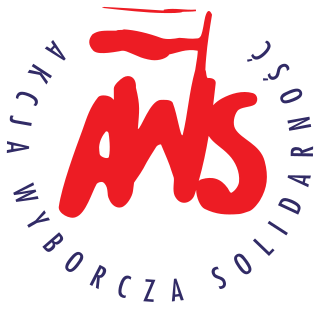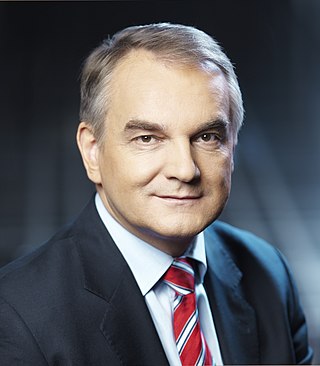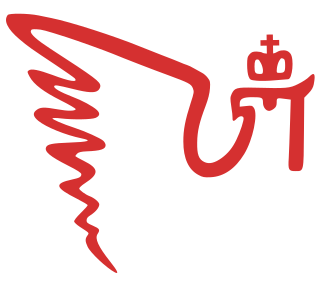
Solidarity Electoral Action was a coalition of political parties in Poland, active from 1996 to 2001. AWS was the political arm of the Solidarity trade union, whose leader Lech Wałęsa, was President of Poland from 1990 to 1995, and the successor of the parties emerged from the fragmentation of the Solidarity Citizens' Committee.

The president of the Council of Ministers, colloquially and commonly referred to as the prime minister, is the head of the cabinet and the head of government of Poland. The responsibilities and traditions of the office stem from the creation of the contemporary Polish state, and the office is defined in the Constitution of Poland. According to the Constitution, the president nominates and appoints the prime minister, who will then propose the composition of the Cabinet. Fourteen days following their appointment, the prime minister must submit a programme outlining the government's agenda to the Sejm, requiring a vote of confidence. Conflicts stemming from both interest and powers have arisen between the offices of President and Prime Minister in the past.
From 1989 through 1991, Poland engaged in a democratic transition which put an end to the Polish People's Republic and led to the foundation of a democratic government, known as the Third Polish Republic, following the First and Second Polish Republic. After ten years of democratic consolidation, Poland joined NATO in 1999 and the European Union on 1 May 2004.

The Polish Round Table Talks took place in Warsaw, Poland, from 6 February to 5 April 1989. The government initiated talks with the banned trade union Solidarność and other opposition groups to defuse growing social unrest.

Lech Aleksander Kaczyński was a Polish politician who served as the city mayor of Warsaw from 2002 until 2005, and as President of Poland from 2005 until his death in 2010. Before his tenure as president, he previously served as President of the Supreme Audit Office from 1992 to 1995 and later Minister of Justice and Public Prosecutor General in Jerzy Buzek's cabinet from 2000 until his dismissal in July 2001.

Jan Ferdynand Olszewski was a Polish conservative lawyer and politician who served as the Prime Minister of Poland for five months between December 1991 and early June 1992 and later became a leading figure of the conservative Movement for the Reconstruction of Poland.

Waldemar Pawlak is a Polish politician. He has twice served as Prime Minister of Poland, briefly in 1992 and again from 1993 to 1995. From November 2007 to November 2012 he served as Deputy Prime Minister and the Minister of Economy. Pawlak remains Poland's youngest prime minister to date.

Hanna Stanisława Suchocka is a Polish political figure, lawyer, professor at Adam Mickiewicz University in Poznań and Chair of the Constitutional Law Department, former First Vice-President and Honorary President of the Venice Commission.

Presidential elections were held in Poland on 8 October 2000. Incumbent President Aleksander Kwaśniewski was easily re-elected in the first round with more than 50% of the vote, the only time a direct presidential election in Poland has not gone to a second round.

Presidential elections were held in Poland on 5 November 1995, with a second round on 19 November. The leader of Social Democracy, Aleksander Kwaśniewski, and incumbent President Lech Wałęsa advanced to the second round. Kwaśniewski won the election with 52% of the vote in the run-off against 48% for Wałęsa.

Jan Krzysztof Bielecki is a Polish liberal politician and economist. A leading figure of the Gdańsk-based Liberal Democratic Congress in the early 1990s, Bielecki served as Prime Minister of Poland for most of 1991. In his post-political career, Bielecki served as president of Bank Pekao between 2003 and 2010, and served as the president of the Polish Institute of International Affairs between 2009 and 2015. Since the early 2000s, Bielecki has been a member of the Civic Platform party. In 2010, the Warsaw Business Journal described Bielecki as one of the most respected economists in Poland.

Antoni Macierewicz is a Polish politician and the former Minister of National Defence. He previously served as the Minister of Internal Affairs, Head of the Military Counterintelligence Service, and Minister of State in the Ministry of National Defence.

The Citizens' Movement for Democratic Action was a political faction in Poland coalescing several members of the Solidarity Citizens' Committee.

The Centre Agreement was a Christian-democratic political party in Poland. It was established in 1990 and had its roots in the Solidarity trade union and its political arm, the Solidarity Citizens' Committee. Its main leader was Jarosław Kaczyński. The party was initially the party of choice of Polish president Lech Wałęsa and heavily cooperated with him and his environment between 1990 and 1992, leading the first post-communist governments. In 1991, Jan Olszewski from Centre Agreement gained the support of Wałęsa for his candidacy for Prime Minister, forming a PC-led government. However, the government was mired with internal conflicts in 1992 and fell to a vote of no confidence. Afterwards, the party was increasingly marginalized and became a part of Solidarity Electoral Action in 1997. In 1999, the bigger faction of the party left to the newly created Polish Christian Democratic Agreement; further, in 2001, the leadership of the party dissolved Centre Agremeent to found Law and Justice, the direct successor of the party. However, it wouldn't be until a year later that it would dissolve.

Andrzej Bohdan Celiński is a Polish politician. Until 1989 activist of the democratic opposition in Poland. Former Member of Senate and Sejm. Minister of Culture in the government of Prime Minister Leszek Miller (2001-2002).
Waldemar Pawlak was the only person to serve twice as Prime Minister of the Republic of Poland during the Third Republic period (1989–present) prior to the re-election of Donald Tusk in 2023.

The Cabinet of Tadeusz Mazowiecki, led by Prime Minister Tadeusz Mazowiecki, came to power following the 1989 legislative election. He was nominated by the President as the Prime Minister on 24 August 1989 in order to form a new government after the Sejm rejected the Communist cabinet of Czesław Kiszczak, and subsequently obtained the mandatory motion of confidence in the Sejm on 12 September 1989. The cabinet resigned on 25 November 1990, and the Sejm accepted the resignation of the cabinet on 14 December, though it continued to perform its duties until the formation of the Cabinet of Jan Krzysztof Bielecki on 4 January 1991.

The Polish Union, also known as the Regional Agreement RdR in 1993, was a Christian-democratic centre-right political party in Poland. The party was founded by defectors from Polish Christian-democratic party Movement for the Republic, who left the party over the dispute regarding forming a possible coalition with Centre Agreement, the party that Movement for the Republic was itself a split from. Shortly after being formed, the Polish Union announced an electoral union with the Centre Agreement in June 1993, known as Centre Agreement – Polish Union.

The Third Republic Movement was a minor conservative political party in Poland functioning between 1992 and 1995, when it united with the Movement for the Republic to form the Movement for the Reconstruction of Poland.
The Centre Agreement – Integrative Initiative was a Christian-democratic political party in Poland. It was founded by the former secretary and member of the executive board of Centre Agreement (PC) Wojciech Dobrzyński, who was stripped of his functions on 5 October 1994, and then expelled from the party by Jarosław Kaczyński in January 1995. Kaczyński expelled Dobrzyński over his willigness to cooperate with the right-wing Christian National Union, a party that wanted to create an All-Polish electoral alliance that would unite all right-leaning parties in Poland but exclude the PC.

















